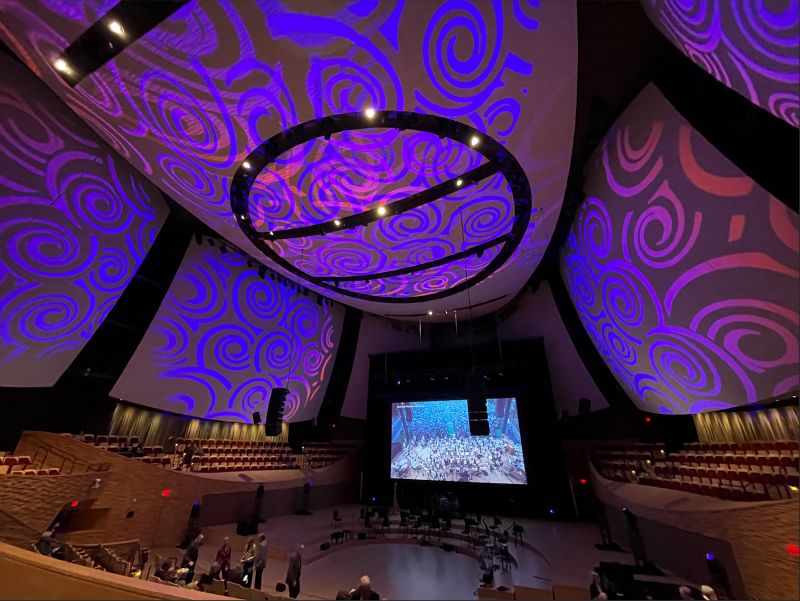The first thing I noticed when I arrived at Bing Concert Hall was that I was almost comically underdressed. In a room of extravagantly fitted donors and surrounded by more wool than a sheep farm, I settled in my seat wearing a tour shirt from a Japanese sludge metal band and Doc Martens.
For the excited concertgoers and lavish patrons in the audience, that night was far more than a “Bing Fling” night of live music: it was the representation of the 10-year anniversary of the opening of the $111.9 million Bing Concert Hall itself. As a mere third-party spectator, I still believe it was an exciting and unexpectedly intimate signal of the future of Stanford’s beloved venue.
Although Saturday’s “Celebrating Stanford Live’s Next Decade” was billed as a congratulatory occasion with an appearance by the enigmatic songwriter Rufus Wainwright, it was structured like a traditional concert.
The main event with Wainwright was around an hour and seemed to tie the bow on the first 10 years of the celebrated Stanford venue. His performance featured dozens of instruments, an orchestra, varied musical genres and more.
“It put me through boarding school,” said Wainwright immediately after opening the show with the novelty song “Dead Skunk (in the Middle of the Road),” which was written by his father, Loudon Wainwright III.
“Now that that’s over …” he said, trailing off to laughs. I had the feeling that he really wasn’t joking.
The rest of his set consisted of a nearly 50/50 split between original songs and covers which were arranged and performed in Wainwright’s trademark ornate style. As I consider him a unique and fascinating songwriter, I was a little disappointed to hear so many covers (especially of songs like Leonard Cohen’s “Hallelujah” and “Over the Rainbow” from “The Wizard of Oz”). They were fine — but I’m not sure that he added much to these songs compared to artists like Jeff Buckley or Israel Kamakawiwoʻole.
There were two (admittedly) fantastic opening acts: a performance of Justin Peck’s “Hurry Up, We’re Dreaming” by two members of the San Francisco Ballet, and a performance of the first movement of Franz Schubert’s String Quintet in C Major by the Rains String Quartet.
The lights dimmed and the rowdy crowd settled down about 10 minutes after the 8 p.m. showtime. Silence. Suddenly, almost as if it were an accident, two people stumbled toward each other on stage. Like gravitational motion, they made their way toward center stage and met each other in the middle, swirling around a non-existent axis until a piano kicked in: it’s ballet! A technical marvel of movement, Ellen Rose Hummel and Wei Wang from the San Francisco Ballet moved elegantly through a free-flowing, cohesive choreography that told a story.
It was quite a unique introduction to the 10-year anniversary. Instead of going for immediate grandiosity, the show began with a warm intimacy that invited the audience into this moment of triumph for the university’s art scene. The choice was both tasteful and effective, but this is not to say that there was no bombast.
The Rains String Quartet performed a masterful rendition of Schubert’s famous final string quintet, which is among the most famous in classical music. For just five performers, the performance was fierce and loud, with beautiful dynamics and pure synchrony between the performers. The richness of the sound was impressive, with booming cello hits and piercing violin encompassing the entire room. The numerous runs and passages sounded incredibly clean. I noticed that the audience members around me were on the edge of their seats.
Between performances, Stanford Live’s McMurtry Family Director Chris Lorway painted a picture of a united show which was “a representation of the many connections Bing has made.” Essentially, the performance aimed to unite a web of artists all somewhat interconnected in their role in the history of this decade-old venue.
Wainwright, however, painted a slightly different story. “Well, they asked me to do it and I said ‘okay,’” Wainwright said when I sat down for an interview with him. “It seemed like a fun event, and I’m not sure if I’ve ever been to Stanford, but I heard it’s quite beautiful.”
He’s talented, a great performer and a fantastic conversationalist, but one can’t help but wonder why Stanford did not bring back one of the many hundreds of artists who actually do have a noted connection to the venue. In fact, before the show, there was a projector displaying photos of other performance groups, dancers, singers and instrumentalists who visited Bing. It would have been much more fitting for the supposed spirit intended for the event.
Still, the event was worth my time. The artists were lively and engaging, and there were numerous different artistic fields explored over the course of the two-hour variety concert. “Folk music is about the essentials,” Rufus Wainwright said to me. “Music is about creating a very intimate experience that’s about the here and now and therefore connects to eternity.” With this decade-defining Bing celebration in mind, I cannot help but agree with him.
Editor’s Note: This article is a review and includes subjective thoughts, opinions and critiques.
